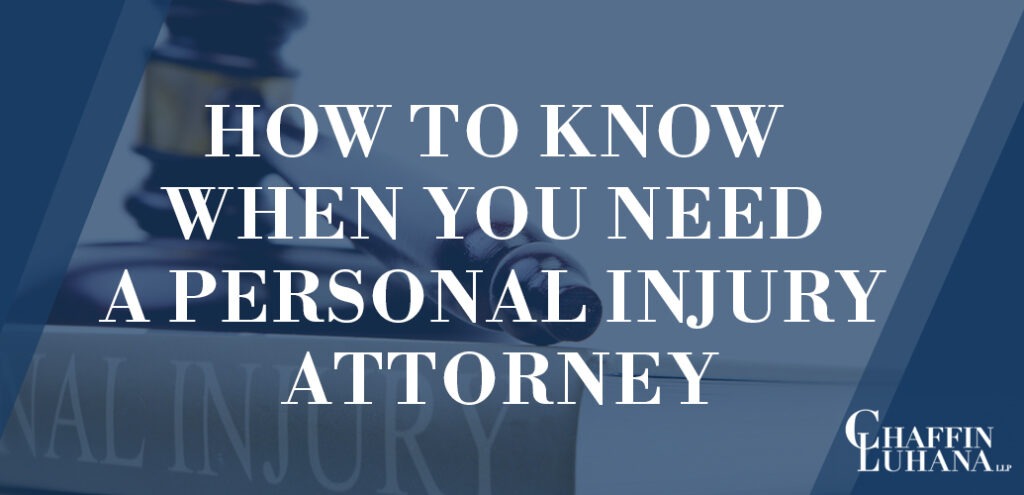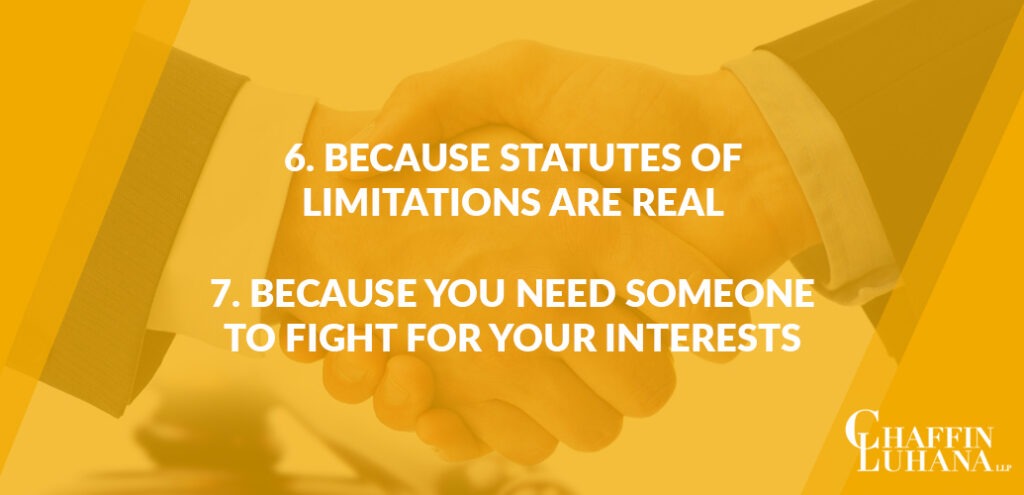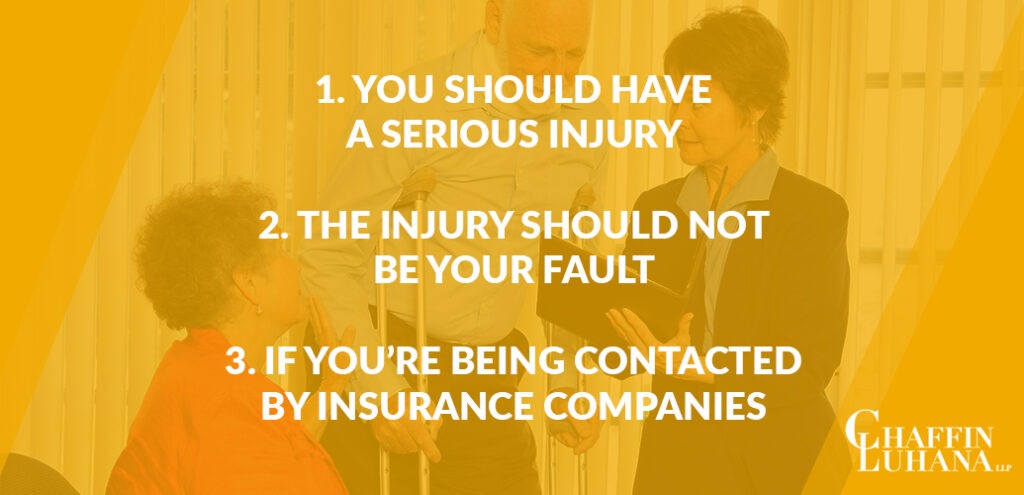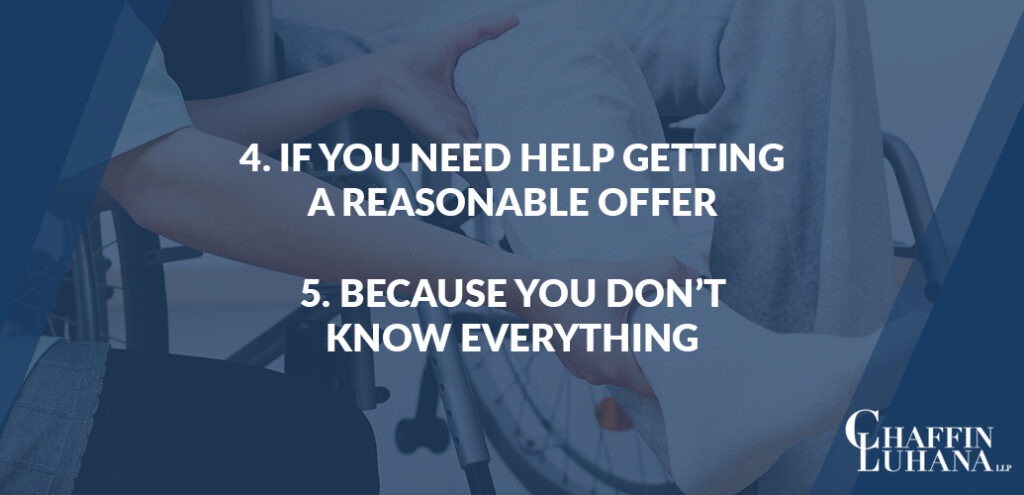How to Know When You Need a Personal Injury Attorney


Navigating the aftermath of an injury—whether at work, in a car accident, or in some other venue—can be emotionally and physically taxing.
You must deal with any medical consequences that have come from the accident, and these can sometimes be severe and lasting. And you must also figure out the financial fallout of lost wages, insurance payments, and medical costs.
And atop all this, you might have to fight with insurance companies for proper compensation or with an employer for workman’s comp..
To call the consequences of most accidents a maze or a jungle would not be much of an exaggeration. You will need help navigating these waters.
That is where a lawyer comes in. While not every single accident requires legal representation, many do, and that is what this article will focus on. We’ll examine some of the different reasons why you might need a lawyer, and how you can know.
1. You should have a serious injury
This is the easiest way to determine if your case requires an experienced personal injury attorney. Let’s say you work for a grocery store, and while restocking shelves you trip—maybe because of a recently-washed aisle, maybe because of an untied shoe—and take a tumble.
Now, technically this is a “slip-and-fall,” but if all that was bruised is your ego, it isn’t a case requiring a lawyer (or even likely any insurance compensation).
The more severe your injury is, the more necessary it is for you to have a lawyer. Why? Because the more complicated the case becomes, the more money that is at stake (via the insurance claims, lost wages, etc.), and the greater potential ramifications.
If you are driving your car and obeying the law, but a drunk or careless driver swerves into your lane and totals your car, broken ribs and needing a cast on your leg, that’s an example of a case where a lawyer is not merely necessary, but imperative.
2. Moreover, the injury should not be your fault
Generally, personal injury cases work best the less likely it is that you were at any fault.
Take the classic example of a drunk driver. You may be doing all you are supposed to do to drive safely and be mindful of other drivers. You cannot control the other driver’s blood alcohol level, their double vision, their brain functioning, or their lead foot.
In other words, you were victimized by their carelessness.
While obviously there are more examples of personal injury than automobile accidents, you will need a lawyer if the injuries you sustained were substantially and demonstrably the fault of the other party.
That means you will need legal representation whether in court or in a settlement.
3. If you’re being contacted by insurance companies
It is almost always a good idea to involve a lawyer if you expect to have sustained and possibly negative or difficult interaction with an insurance company. This is the case even if you are simply trying to settle apart from a trial.
Here’s why: Insurance companies are businesses. They want to make the most money possible while having to pay out the least amount to you. And this means it is not uncommon for insurance companies to attempt to get you to agree to a payout that is far less than you deserve.
Sometimes victims will want to sign shallow agreements just to make the whole thing go away. But before you do—which legally binds you to accept the company’s offer and means you cannot contest or revoke it—check with a lawyer.
They will know what injuries like yours are worth, and will know how to address additional issues like payment of medical costs, pain and suffering, lost wages, and even compensation for family members.
You will not know all of the legal tactics that can be used to defend you, negotiate fairly and firmly with the insurer, and how much to demand in a payout. The lawyer will. You have no way of knowing if the insurance company is taking advantage of you unless you are working with an experienced lawyer. You shouldn’t go it alone.
A good lawyer will threaten a lawsuit if the settlement offer is unreasonable, and this will provide added security when dealing with the company.
4. If you need help getting a reasonable offer
Going back to insurance companies being businesses: Some will try to give you less than what you deserve, and they will defend it by saying you have not proven the extent or severity of your injuries, or the ongoing impact they have had.
Obviously, context has to be given to defend the reality of your suffering and to receive proper compensation. This context can be best established through the work of an experienced attorney.
For example, many people do not realize that compensation is more than just paying for medical bills. Consider things like:
- Lost wages from inability to work
- Time lost with family as well as the stress and sacrifices placed upon them
- General pain and suffering, specific
- Yet-undetected health ramifications
To receive proper compensation for these additional aspect of your suffering, you will need to prove they actually happened. Often, experts are needed for this kind of work.
Counselors can evaluate your mental and emotional state and that of your family. Doctors can monitor your health progress and determine what if any possible future ramifications there could be. Financial advisors and economists could calculate the total financial cost, factoring in lost wages and other issues.
A good lawyer will know when these additional, specialized proofs are necessary, how to get them, and how to correctly include them in your case so that they count as evidence.
5. Because you don’t know everything
Many people assume they are qualified to work directly with the claims adjuster because they have actually experienced the loss, pain, and suffering they are explaining. And in a sense, of course, this is true (your lawyer is not experiencing it).
But the problem with people representing themselves is that they do not know everything—not about their case, not about how insurance companies will interpret the facts, not about what to say, and sometimes more importantly, what not to say.
You want someone who knows where the bends and bumps in the road ahead are that you can’t see, knows how to make counter offers and demands, and how to put legitimate pressure on the company.

6. Because statutes of limitations are real
These will differ based on your state.
When you are injured, legally you only have a certain amount of time to file a claim and (if necessary) open a lawsuit. This is because memories fade, injuries heal, and other things happen that become more difficult to prove and document the longer one files from the alleged incident.
If you do not file a claim within a specified amount of time from the accident, you lose all legal right to file forever. That means no court case, no insurance payments, etc.
Besides helping you navigate all of the moving pieces within the pursuit of the claim or lawsuit, a lawyer will help you know when the statute of limitations expires in your state and what needs to be done when.
7. Because you need someone to fight for your interests
The insurance adjuster is fighting for the interests of their company.
Besides having the added security of dealing with someone who knows the system and its loopholes, a good lawyer intends to use his or her expertise and acumen to fight for you and help you get what you deserve in a way you cannot get on your own.
A lawyer is there to advise you of options and resources that you either could not know or could not obtain on your own.
This is why a good lawyer is intimidating to insurance companies. It says to them that you have resources and advocacy that is greater than what you could bring by yourself. You are also more likely to be listened to and dealt with respectfully and quickly if you have legal representation.
Conclusion
While not every single possible injury needs a lawyer, many cases are of the kind that you’d be foolish and asking for trouble to not have one. These guidelines will help you figure out if you need good legal representation as you deal with insurers and other entities, and will give you the confidence that comes from knowing you have an experienced, qualified advocate fighting for what you deserve.


